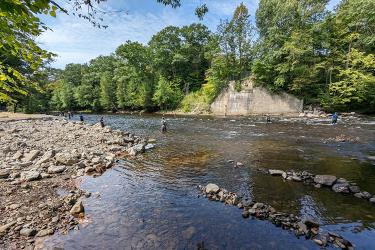Internships at NOAA really are win-win: Students gain valuable workplace experience and learn directly from experts in areas they are considering for their careers. And NOAA benefits from additional resources, as talented students share their energy, knowledge, and perspectives. Interns contribute significantly to efforts to protect and restore the Chesapeake Bay.
In summer 2020, the NOAA Chesapeake Bay Office offered five internships, covering a range of Chesapeake Bay science-related topics. Each paid internship ran 12 weeks (mid-May through mid-August). They were intended for students who were entering their sophomore, junior, or senior year of undergraduate study.
We partnered with the Chesapeake Research Consortium to offer internships through two programs.
Chesapeake-Student Recruitment, Early Advisement and Mentoring (C-StREAM) Program
C-StREAM focuses on recruiting, advising, and mentoring college students from communities that are currently underrepresented in the environmental field and that historically have been excluded from opportunities to pursue careers in environmental research and management. For these internships, C-StREAM accepted applications from students who identify as people of color and/or who are first-generation college students. We hosted two summer interns through C-StREAM in 2020:
The Field Technician Intern supported our field program through oyster reef monitoring, water column and nearshore habitat monitoring, and acoustic telemetry data collection. Work will be conducted on a range of vessel platforms and sizes.
The Chesapeake Bay Restoration and Protection Policy intern helped to develop an “indicator”—tracking statistics—on forage species that will be used by resource managers as they consider management of pretty for key predators.
NOAA Chesapeake Bay Summer Internship Program
The NOAA Chesapeake Bay Summer Internship Program offers undergraduate students the opportunity to work with NOAA and Chesapeake Bay Program personnel on science, policy, and education programming. We hosted three interns through this program in 2020:
The Climate Change Indicator Development Support Intern identified data and devise ways to use this information in “indicators” that will be used to track trends and progress toward advancing climate resiliency.
The Buoy Data Visualization Intern assisted with updating capabilities for an application that visualizes data from the NOAA Chesapeake Bay Interpretive Buoy System.
The Environmental Literacy Database Support Intern developed and populated a database that includes georeferenced data and descriptive information about environmental education grant recipients and program participants. They supported planning and implementation of summer teacher workshops and conferences.
We are committed to supporting a diverse and inclusive science-oriented workforce. We highly encourage applicants from historically black colleges and universities, Hispanic-serving institutions, and tribal colleges and universities.



